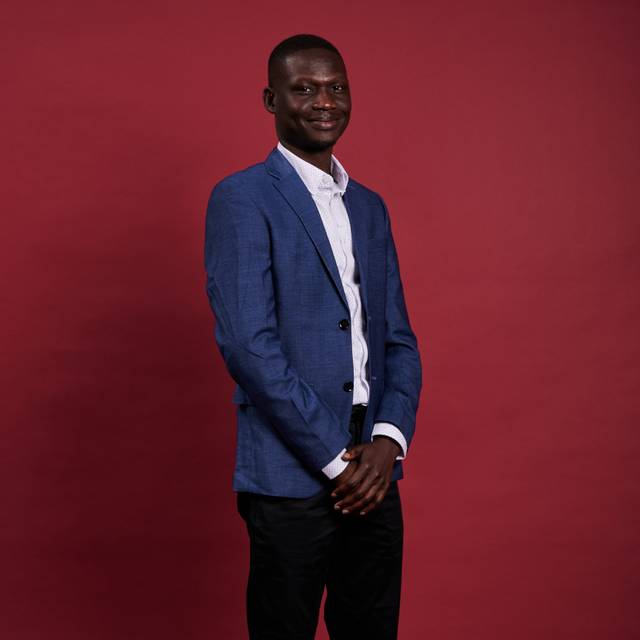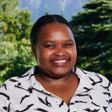
Scholar Stories
New skills for a new nation: Meet Ismail Ombo Dumutu from South Sudan
Ismail Michael Ombo is the first Mandela Rhodes Scholar from South Sudan, the world’s most recent sovereign state. Here he shares what it was like growing up during the recent civil war, and his hope for his country.
You grew up in Sudan during a very turbulent time. Tell us a little bit about your upbringing.
My dad joined a rebel movement called the Red Army that fought against the government of Sudan when he was 14 or 15 years old. When he was 20, he met my mom. In a rebel movement you don't have holidays, so he was away from home most of the time during my upbringing. When I was around four years old, in 1998, my dad decided to leave the movement and we moved to his hometown in Yambio. We stayed on the farm, and as my dad had a large plot of land we didn't have to worry about what to eat. My maternal grandfather's home was in a rural area, and I fell in love with taking care of cattle. I started school in 2001 and I loved it immediately.
Those are the things that made me happy: the animals at my grandparents’ house and going to school. In terms of quality of education, in my area it was good. Both my primary and secondary were Adventist schools which are better quality than government schools. I did well, especially in high school. I'd say those years were my happiest. My dad was very supportive. This was after the 2005 Peace Agreement, and army employees were now salaried workers, unlike in the rebel movement where they worked for free. He took good care of us. The years I spent in boarding school were defining; that's when I started taking leadership responsibilities; I was the head boy for example.
Can you think back to a moment where your life changed?
My cohort was the first to graduate high school in the newly formed South Sudan, in 2012. I had to sit for the Sudan final exams as well because we were not sure if the new country’s exam system would be recognised elsewhere. After completing, my dad told me about the United World Colleges program which brings young people from all over the world together. I studied with students from 90 countries. I left South Sudan to study in Oklahoma in August 2013, and in December 2013 the conflicts started in South Sudan. This destroyed the economy and drove up inflation. Since the conflict, our monthly household income is now worth less than $10. If I had not left, I would not have continued beyond high school as there wouldn't have been money to study.
What are you studying and when did you decide on this path?
I'm studying a master’s degree in programme evaluation. It happened through continuous soul searching and trying to find what my calling was, why I am here, and what I need to contribute. My background was chemical engineering. [When I was] growing up we used to make toy cars out of sorghum straws, and make spoons and plates by melting scraps of aluminum. In school, when we started doing chemistry, biology and physics, I could relate to it. Chemistry in particular was appealing to me because everything we do has chemistry in it.
So why programme evaluation?
After graduation, I was employed as a quality control technician for a bio-technology company. I found that working in the lab was not for me. I then worked as a research analyst for an investment company who advised big institutional investors. This was a lot more stimulating. Their work was holding companies accountable to their shareholders. In July 2020, I moved back to South Sudan where I stayed home for a year without work. I eventually started working for Water for South Sudan who are responsible for drilling wells, construction of sanitation facilities and the water towers that distribute water to communities. During that time, we worked on a project for UNICEF to drill wells and rehabilitate old wells to make them functional again, and construct hand washing facilities and latrines. I was heading that project as the engineer. I noticed that communities were more interested in people who drilled wells than those who constructed sanitation facilities and latrines. I realised that we were trying to change people's behaviour by asking them to use sanitation facilities, and this was foreign to them and went against some of their cultural beliefs. A lot of money was being spent, but not a lot of it was being effective. It made me think of how one can hold organisations accountable for the money they're spending, and this is where the idea of monitoring and evaluation came from.
What would make you feel like you have achieved success?
For me, two things come to mind, my family, and my career.
Success to me would be if all my siblings were able to attain at least an undergraduate qualification. In terms of my career, what would make me happy is if what we do for our communities helped uplift them.
From 2013 to now, many organisations have worked in South Sudan and spent millions with little to show for it. People's conditions have not changed. There is still hunger and children are still not getting quality education, and the health facilities are still bad. The designs of these projects are not taking our communities' needs and desires into account; and for me that needs to change.







